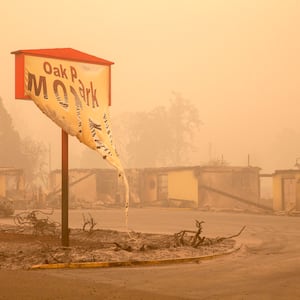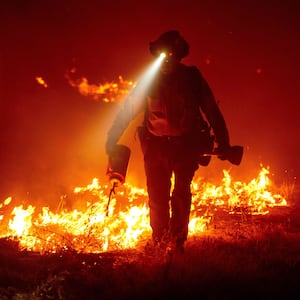The wildfires engulfing the West Coast have become so dire in Oregon that state police have established a new type of emergency response: a mobile morgue.
The state-run facility in Linn County, about two hours outside of Portland, will be operated by a 75-member regional response team that is searching incinerated properties for survivors and victims.
While the wildfires have hit 10 states across the country, Oregon has been among the worst affected, with more than 30 active fires, at least 900,000 acres burned, eight deaths, and at least 50 people missing. More than 10 percent of the state’s population has been forced to evacuate, and state officials have begged for a presidential disaster declaration.
“One week into this wildfire crisis, our state has been pushed to its limits,” Oregon Gov. Kate Brown tweeted on Monday evening.
The death toll is expected to rise as recovery efforts continue, prompting local officials to use out-of-state resources for a mobile morgue. The facility will quickly identify remains and a separate facility, expected to open this week, will use rapid DNA testing to aid in identification.
The mobile morgue—once a symbol of the coronavirus pandemic still plaguing the country—will “give family members closure as soon as possible,” Oregon State Police Capt. Tim Fox told The Oregonian.
“We understand this is a super tragic event. We understand this is hard,” he added.
Thousands of residents across the West Coast have lost homes to the destructive wildfires, and at least 36 people in three states have died.
It took just 45 minutes for Angie Jackson’s family in Talent, OR to have everything they own “burn to a crisp” last week.

Entire streets in Talent, Oregon, were raised to the ground.
David Ryder/GettyJackson said her mother, Corlette, was sleeping on Tuesday after finishing a graveyard shift when she received a call from her other daughter about the Almeda Drive wildfire quickly moving toward the town of 6,641. Jackson’s father, Brian, and brother, Josh, were “hanging out” on the other side of the Totem Pole trailer park, unaware of the wildfire about to wipe out the entire town on the southern edge of the state.
When Corlette woke, all she could see was smoke. “She told my sister, ‘I think we are going to be fine,’” Jackson, 33, told The Daily Beast.
But less than 10 minutes later, her mother and brother opened their front door to find the driveway of the trailer park alight, prompting Corlette to suggest fleeing the home they’d lived in “forever.”
“Seconds later, a sheriff’s deputy loudly banged on their front door, telling them they had less than five minutes to get out of their home,” Jackson said. “They only took their pets and my dad’s diabetes medication. The only clothes they took were the ones on their backs.”
Just five minutes after they fled, the trailer park—and most of Talent—was completely “scorched,” Jackson said. Her family had already suffered hardship this year when Brian was laid off due to COVID-19, but Jackson said the most heartbreaking part of learning her parents’ home was destroyed was her mother’s realization that she left her wedding ring behind.
“It was my great-grandmother’s ring,” Jackson said, while choking up. The family is staying at an aunt’s house and is anxious to go home and “start their life again.” “It’s heartbreaking to think about them going back home and finding the earth completely scorched. They thought they were going to go back. Now they have to start all over,” she said.
As of Tuesday afternoon, upwards of 30,000 emergency personnel continue to fight blazes that have burned more than 4.7 million acres in 10 states, according to the National Interagency Fire Center. Residents near 39 large fires in California, Oregon, Washington, and Colorado remain under evacuation orders—while officials in Idaho have also issued evacuation orders.
Six fires, however, have been contained as rain showers are expected to move into Oregon and humidity will trend across the Pacific Northwest, a development that may bring some relief.
“Even with the gradual upward trend of relative humidity, conditions will remain critically dry across much of eastern Oregon, California, the Great Basin, and western Montana,” the National Interagency Fire Center added.
Experts warned that unpredictable wind gusts of up to 25 mph, combined with dry weather, may fuel the ongoing disaster.
“In California, these La Nina winds that are coming are expected to be hotter and dryer—which is the perfect conditions for these fires to continue,” Maureen Kennedy, an assistant professor at the University of Washington, Tacoma, who specializes in forest management, told The Daily Beast. “Washington State is about to enter the cooler season, so I think we are in a good spot to make progress for the fires.”
Winds have pushed smoke across the country and into Canada. On Tuesday, skies over the East Coast, including New York City and Baltimore, were engulfed in a milky haze from blazes thousands of miles away. Alaska Airlines suspended flights out of Portland and Spokane on Monday due to “thick smoke and haze.”
Relief for firefighters may be several days away, according to experts, who said winds may disperse smoke hanging over West Coast cities but will probably fan the fires.
“Right now, there is a lot of wind and fire weather that is too extreme—forcing a lot of emergency personnel to have to wait until the weather changes before taking actionable steps,” Meg Krawchuk, an associate professor at the Oregon State University College of Forestry, told The Daily Beast.
“But as the winds shift this week from west to east, this will allow people on the west side of the fire to start setting up their containment lines to get more help on that side that has been hit the hardest by these fires.”
State officials have scrambled to contain the domino effect caused by the West Coast fires, using emergency services already strained by the coronavirus pandemic and requesting help from neighboring states and the federal government.
President Donald Trump met with California Gov. Gavin Newsom on Monday to discuss the wildfires, an issue the Democratic governor said was the latest example of catastrophic climate change. Trump, who has been openly skeptical of climate science, seemed to dismiss his pleas to accept the science behind global warming, instead blaming forest mismanagement as the main culprit.
Following the meeting, Washington Gov. Jay Inslee wrote in an open letter to Trump, slamming the president for refusing to address climate change and saying it would “accelerate devastating wildfires like those you’re seeing today.”
“The rules of fighting wildfires are changing because our climate is changing,” Inslee wrote. “There is no fire suppression plan on this planet that does anyone any good if it doesn’t even acknowledge the role of climate change.”
In requesting a presidential disaster declaration on Monday, Oregon Gov. Kate Brown said, “To fight fires of this scale, we need all the help we can get.” While Trump last week approved emergency aid, a declaration would allow additional communications resources, damage assessment teams, and search and rescue support to be distributed.








